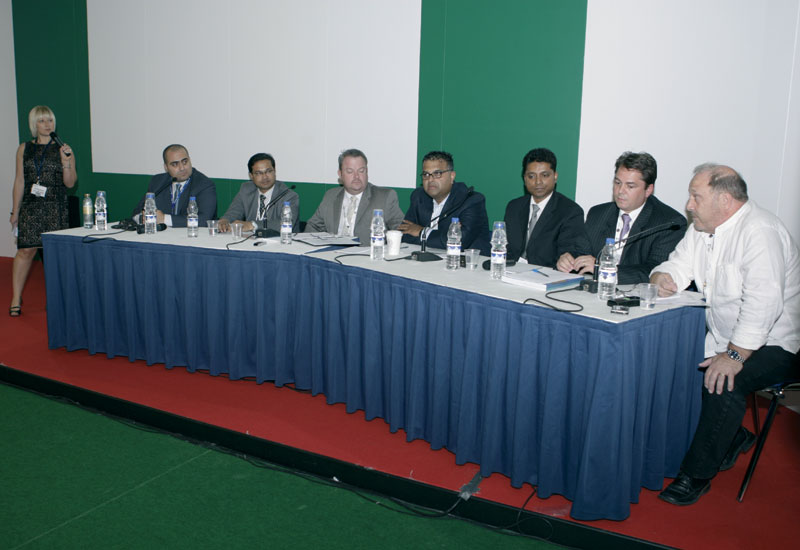 The panel debated whose time and money should be invested in training to progress the regional travel industry.
The panel debated whose time and money should be invested in training to progress the regional travel industry.
A good turnout, probing questions and a heated debate made for a lively training seminar on Travel Agents Day at this year’s Arabian Travel Market
Any concerns that travel agent training was not an issue on the regional industry’s agenda were quashed at this year’s Arabian Travel Market seminar, hosted by Arabian Travel News’ senior group editor Gemma Greenwood.
More than 50 travel agents and travel industry notables piled into the seminar theatre to hear a panel of experts comprising DTTAG manager Leo Fewtrell and TRS Consulting managing director Sundar Vasudaven, along with representatives from Dnata, Oman Tourism, Alpha Travel, Kanoo Travel and Travelport GDS, debate why training issues were preventing the Middle East travel industry from reaching its full potential and who was responsible.
Vasudaven kicked off the discussion acknowledging that service charges meant consumers had higher expectations and said “training is needed to adapt to the growing demands of the market”.
Oman Tourism GCC representative Mark Senior agreed: “In the GCC, training is limited and staff knowledge is poor.
Unless training is brought to the forefront of each agency’s business priorities, many will struggle to offer a standard of service people will pay for,” he said.
He was backed by Kanoo Travel Group country manager Sunil D’Souza, who said a “well-trained workforce is needed to face emerging challenges”, but Fewtrell interjected saying despite this “the vast majority of the regional travel trade did not currently invest in training”.

Advertisement
Travelport’s regional training manager Ibrahim Marmoush was “amazed” agents didn’t take advantage of the courses offered by GDS suppliers. “If agents are keen to learn there are opportunities to do so,” he said. “We don’t only advise on GDS, but also on customer service and soft skills”.
Former Al Futtaim Travel general manager Mike Booker stirred things up from the audience saying the trade had been apathetic in its response to the financial crisis”.
Booker said agents needed to become more proactive and used Arabian Travel Market (ATM) as an example of bad practice.
“Half the stands here are not manned; those that are, are supervised by staff that do not know the answers to questions and some companies have paid for space and not even bothered to turn up.
“The trade needs to invest time and money in training and pay staff a salary that’s worth working for,” added Booker.
Dnata Travel Group general manager Nick Sheppard and D’Souza responded saying that they did provide comprehensive and ongoing training programmes for their staff, but this was met with an angry response from an audience member claiming to be an ex-Kanoo employee.
“I was not satisfied with the courses on offer; there were errors even on the IATA-accredited programmes,” said the agent. “There should be a dedicated school for training the travel trade,” he asserted.
Hearing that there was no training school in this region, a surprised Uganda-based agent in the audience said that even in her country, where the market was much smaller, they had a standard training school for travel agents.
D’Souza agreed: “we need to develop a training school for the trade, by the trade, but there needs to be more commitment from travel agencies and staff retention needs to be improved,” he said.
However, “it all comes down to money,” said Sundar. “Who’s going to pay for the training?” he asked, adding that “for agents, ignorance is bliss, because they don’t have the funds to provide training”.
“DTTAG can’t fund training, we need support from government bodies and bigger sponsorship,” asserted Fewtrell.
Senior said the Oman Tourism board was committed to working with agents and tour operators and spent more than half of its budget on cooperative marketing and training, which included offering fam trips.
This triggered Greenwood to point out that often fam trips were abused, with agencies rewarding management with trips instead of the agents selling the destination.
Sheppard denied this, asserting Dnata provided the right staff on fam trips. “On their return, our employees are required to produce a summary report and are then considered specialists on that destination,” he said. D’Souza said Kanoo Travel used fam trips for two purposes; as a selling tool, but also as “a motivational tool for high performers”.
Despite the training value of fam trips coming into question, the panel recognised it was important that tourism boards and airlines were offering training initiatives in some shape or form.








 Search our database of more than 2,700 industry companies
Search our database of more than 2,700 industry companies









